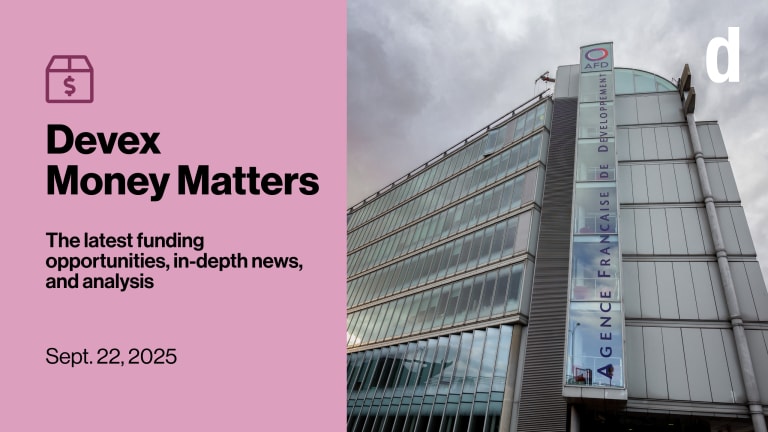
Devex offices — home or otherwise — have been closed this week for a summer break. Instead of our regular Newswire, we’ve been taking deep dives into some of this year's biggest development stories.
Today we’re looking at the fallout from Russia’s war in Ukraine — and the broader threat to democratic governance around the world.
I’m going to start with my recent interview with Natalie Jaresko. She was Ukraine’s minister of finance until 2016 and is now leading a campaign called Stronger Than Ever to raise money — and match it — for medicine and medical supplies for Ukraine.
She also just completed a restructuring of $70 billion in public debt as executive director of Puerto Rico’s Financial Oversight and Management Board, so she knows something about working through a crisis.
Here are some excerpts from our conversation:
If you were Ukraine’s finance minister right now, what would you be doing to mitigate the biggest drivers and consequences of poverty for the Ukrainian people? And what would you be asking the international community to do?
The only solution … is an end to the war. You hear everyone in the Ukrainian government simultaneously saying “weapons, weapons, weapons.” To some extent, that's true. That is the only way to stem the decline in [gross domestic product], to reopen and reenergize the economy, to provide people with jobs, to house people, and provide pensions. You must end this war as soon as possible, and you must prevail.
Secondarily … I would be focused on ensuring the macrofinancial stability for the next six months. Ukraine is running a budget deficit of about $5 billion a month, and the Western community of partners committed about $30 billion, which covered about six months. … So we're going into the winter and we have no credible plan in place — or at least not one that's public — on how to get through the next six months.
What's your assessment of the approach that international institutions have taken so far? Are you seeing the kind of creativity from them that you think is needed?
No. The World Bank and the [International Monetary Fund], who have the deepest pockets, have basically said they’re out of credit space for Ukraine. People have to think out of the box. … I don't think those institutions are terribly creative, typically, but they've proven that they can be. The IMF during COVID proved that it could be. Individual government donors can be creative and have been creative in different times and spaces.
Given that the war is still very much ongoing, is it premature to talk about reconstruction in Ukraine?
No. It's not premature because number one, it is such an enormous scale that needs to be planned; number two, coordinated; number three, confidence-building measures [need to be] installed, whether it's on procurement or other. So it's going to take some planning.
And it's important to discuss [reconstruction] now to create confidence in Ukraine, with Ukrainians who are fighting this war for all of us — that we're there for them. It's important to convey that message to Russia, that we are going to take your assets. We are going to use them because you caused this destruction — continue to cause destruction, continue to create increased costs. We will continue to look for more reparations from you. There is a continued cost of this war.
Read the full interview: How to sustain Ukraine's economy for the next 6 months — and beyond
Opinion: It is not too early to plan for Ukraine’s reconstruction
Funding update: On Monday, the World Bank announced an additional $4.5 billion in funding for Ukraine. The U.S. provided the grant, which comes on top of the $13 billion in emergency financing that the World Bank has mobilized to help Ukraine — more than $6 billion of which has been disbursed since the end of July.
On the line
Next we travel to Bakhmut, a city in eastern Ukraine's Donetsk Oblast, where 42-year-old paramedic Olga Bashey is treating soldiers on the front line of the war against Russia.
This is a rare look inside the fight to sustain emergency health care services — and with them, the war effort itself — as Russia targets health care facilities.
Read more: Inside one of the last emergency clinics in eastern Ukraine
+ Catch up on all our coverage of the humanitarian response to the war in Ukraine, including an on-the-ground reporting on how people with disabilities have been some of the most affected — and most neglected — during the war.
On the brink
Alongside its invasion of Ukraine, Russia is waging a “hidden war” against evidence-based medicine, health experts and civil society representatives warn.
I heard from them last week at the 24th International AIDS Conference in Montreal, Canada, where health workers fighting to sustain essential services described the enormous stakes of the conflict for people at risk of deadly infectious diseases such as HIV and tuberculosis.
Eastern Europe and Central Asia already lag when it comes to controlling such epidemics, and Russia’s policies that criminalize at-risk populations and repress civil society are a big factor. The war is only making things worse.
“I think we should anticipate a major public health crisis across the region,” says Michel Kazatchkine, a special adviser to UNAIDS.
Health system: Ukraine's battle to prevent a regional health crisis
A defining moment
Billionaire philanthropist George Soros has been in the democracy business for a long time. That makes it a little jarring to hear him describe Russia’s invasion of Ukraine as possibly “the beginning of the Third World War.” Even worse, he publicly worries that “our civilization may not survive it.”
Whether you agree with that level of alarm or not, Soros’ Open Society Foundations sees an existential threat to its mission from the contest between democracy and authoritarianism that has escalated into a full-scale ground war in Europe.
George Soros: Why the Ukraine crisis is a defining moment for OSF
Western democracies are also not free from blame.
"Trust is broken, you know, the betrayals of the COVID vaccine in inequity; the cumulative sense of a West that looks after itself first and leaves only the scraps from the table for the rest," says OSF President Mark Malloch-Brown.
Malloch-Brown: The world needs new leaders who can break 'democratic dysfunction'
Help wanted
As Ukraine’s crisis has escalated, so have the demands for people with the right skills and experience to fill critical humanitarian and development roles. Devex Careers Editor Justin Sablich has been closely monitoring these open positions.
Jobs: The globaldev orgs hiring in response to Ukraine crisis
In April, Justin took a deeper dive into what the hiring data tells us about where these jobs are located, what skills they seek, and which organizations are posting them.
Get more insight: Hiring trends for development roles in the Ukraine response (Career)
+ Sign up to Devex Career Hub for global development’s top jobs, expert career advice, and practical tips to help you do more good for more people.
Exploding silver bullets
And yes, it turns out you really do need people to deliver humanitarian services. Not everything can be done by drone, as my colleague Jessica Abrahams explained in April.
One problem is that to deliver the materials people need, a drone would probably need to be powered by liquid fuel, not by batteries.
“It’s likely going to get shot down — and when it gets shot down, it’s basically going to be a missile landing on civilian populations filled with fuel,” said Nathaniel Raymond, a lecturer at Yale University.
Learn more: Why drones can't be used to deliver aid to Ukraine (Pro)
+ A Devex Pro membership brings you essential analysis, data-driven funding insights, and access to the world’s largest global development job board. Experience these perks by signing up to our 15-day free trial.
Sign up to Newswire for an inside look at the biggest stories in global development.








